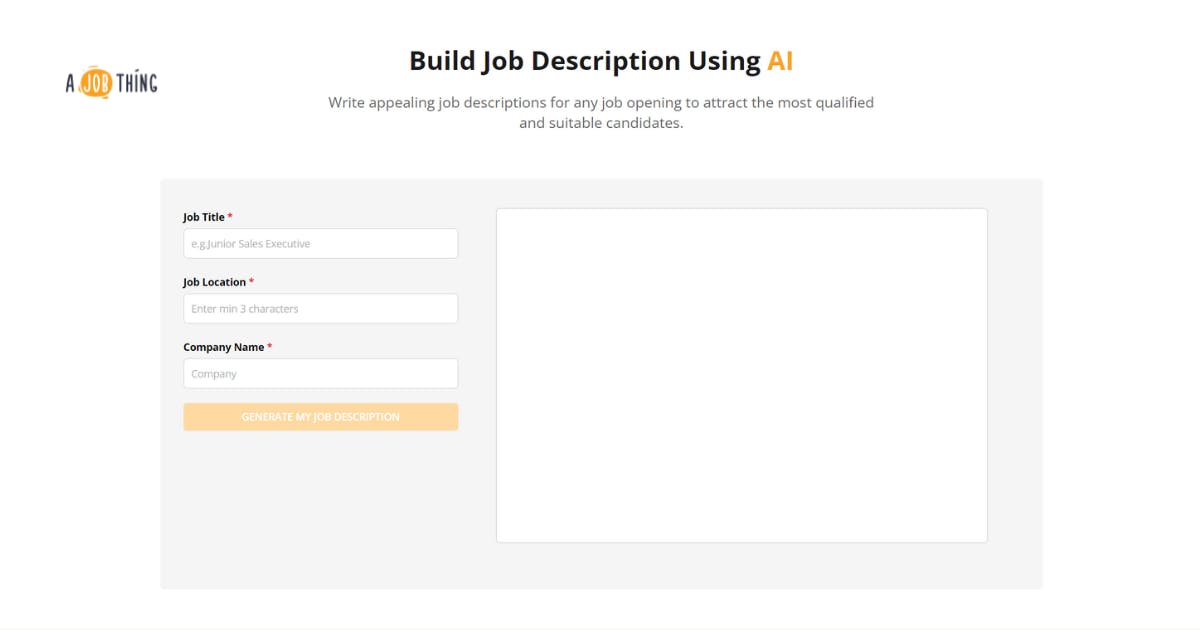
JOB AD
Post your job advertisement to Millions of job seekers in Maukerja, Ricebowl, and Internsheeps.
INSTANT JOB AD
Hire INSTANTLY with AI and get highly relevant candidates in 72 hours

SOCIAL WHATSAPP
Best recruitment solution for mass hiring with a fully automated hiring process.

CAREER PAGE
Build your personalized career page with strong company branding to attract candidates and manage your job vacancy.

JOB AD
Post your job advertisement to Millions of job seekers in Maukerja, Ricebowl, and Internsheeps.
INSTANT JOB AD
Hire INSTANTLY with AI and get highly relevant candidates in 72 hours

SOCIAL WHATSAPP
Best recruitment solution for mass hiring with a fully automated hiring process.

CAREER PAGE
Build your personalized career page with strong company branding to attract candidates and manage your job vacancy.
- Select your industry

Introduction to Technology in Logistics Hiring
In logistics, finding and keeping great talent is important for smooth operations and growth in a fast-paced world. Traditional recruitment methods, with lots of manual work and paperwork, often don't meet the changing needs of the industry. Enter technology – a game-changer that has evolved the logistics hiring process, enhancing efficiency, accuracy, and overall effectiveness.
Related: Logistics Industry: Navigating the Local Supply Chain in Malaysia
The Evolution of Logistics Hiring
Gone are the days of stacks of resumes and tedious sorting processes. Technology has helped logistics companies improve their hiring process, making it faster and more focused. One of the most notable advancements in logistics hiring is the utilisation of Applicant Tracking Systems (ATS). These systems allow recruiters to manage and track candidates throughout the hiring journey, from initial application to the final offer.
Technology plays a crucial role in today's logistics industry, revolutionising the way goods and information are managed, tracked, and transported. Here are some ways technology has transformed the logistics sector:
1. Real-time tracking and visibility:
Tracking systems, GPS, and IoT devices help logistics companies monitor shipments and assets in real-time. This enhanced visibility enables better management of inventory, reduces theft and losses, and provides accurate delivery estimations to customers.
2. Automation and robotics:
Automation technologies, such as robotics and warehouse management systems (WMS), streamline warehouse operations, picking, and packing processes. This leads to increased efficiency, reduced errors, and faster order fulfilment.
3. Transportation management systems (TMS):
TMS software optimises transportation routes and schedules, considering factors like traffic, weather, and delivery deadlines. It helps reduce transportation costs, improve fuel efficiency, and enhance overall supply chain efficiency.
4. Data analytics and predictive modelling:
Logistics firms use data analysis and predictive modelling to predict demand, optimise inventory, and find supply chain problems. This data-driven approach enhances decision-making and overall performance.
5. Last-mile delivery solutions:
Technology has led to the development of innovative last-mile delivery solutions, such as drones and autonomous vehicles. These advancements improve the speed and efficiency of delivering goods to customers' doorsteps, especially in urban areas.
6. Electronic Data Interchange (EDI):
EDI facilitates the exchange of information electronically between different parties in the supply chain, reducing paperwork and manual data entry. It speeds up communication and improves accuracy in order processing.
7. Cloud computing and SaaS solutions:
Cloud-based logistics platforms provide scalable and accessible solutions for logistics management. They enable real-time collaboration among different stakeholders, regardless of their location.
8. Supply chain visibility platforms:
Supply chain visibility platforms let everyone in the supply chain access and share information securely and transparently. This fosters collaboration, reduces delays, and improves overall supply chain performance.
9. Artificial Intelligence (AI) and Machine Learning (ML):
AI and ML technologies can analyse vast amounts of data to identify patterns, optimise routes, and predict potential disruptions in the supply chain. They enable better decision-making and proactive risk management.
10. Blockchain technology:
Blockchain provides a decentralised and secure ledger that tracks the movement of goods and verifies the authenticity of documents and transactions. It enhances transparency and trust in supply chain operations.
11. Mobile applications:
Mobile apps improve logistics operations by providing access to information, updating shipment statuses, and facilitating communication.
Related: What Recruiters Don't Share With You When Hiring in the Logistics Industry
Applicant Tracking Systems (ATS)
Applicant Tracking Systems (ATS) platforms are like the command centres of modern recruitment. They enable logistics companies to create customised job postings, post them across multiple job boards, and receive applications electronically. The advantages are many: applications are in one place, making it easier to review candidates and save time on administrative tasks. ATS platforms also allow for keyword-based searches, helping recruiters quickly identify applicants with the desired skills and qualifications.
Beyond this, ATS software automates communication with candidates. Acknowledgment emails, status updates, and interview invitations can be sent automatically, ensuring candidates are engaged and informed throughout the process. This improves the candidate experience and allows recruiters to concentrate on important tasks like evaluating cultural fit and discussing job offers.
Related: Top 5 Recruitment Techniques for Logistics Talent with Technology Proficiency
Video Interviews
The logistics industry often requires candidates to possess a mix of technical skills, flexibility, and problem-solving capabilities. Video interviews are helpful for recruiters to assess candidates remotely. They provide the same level of interaction as an in-person interview. This allows recruiters to evaluate candidates effectively, even from a distance.
Virtual interviews save both time and resources. Recruiters can now connect with candidates worldwide without needing to travel, thanks to the elimination of geographical barriers. This is particularly beneficial in the logistics industry, where talent can be scattered across various locations.
Moreover, video interviews can be recorded and revisited by hiring teams. This improves teamwork by letting team members share their thoughts and opinions freely, without worrying about scheduling conflicts.
Related: Elevate Your Hiring Process with Comprehensive Interview Guides by AJobThing

Data-Driven Decision Making
Technology has opened up new vistas of data collection and analysis, and the logistics hiring process is no exception. By harnessing the power of data analytics, companies can identify trends, optimise hiring strategies, and make informed decisions.
Recruitment analytics provide insights into various aspects of the hiring process. Time-to-fill metrics measure how long it takes to fill a job, helping companies improve their processes for efficiency. The conversion rates at each stage of the hiring process indicate areas for improvement. Source tracking helps identify the job boards or platforms that are most effective in finding good candidates.
AI and Automation
As technology continues to evolve, the logistics industry can look forward to even more advanced solutions. Artificial Intelligence (AI) is poised to play a significant role in predictive hiring analytics. By analysing historical hiring data, AI algorithms can forecast future staffing needs, allowing logistics companies to proactively plan their recruitment efforts.
Additionally, automation can further streamline logistics hiring. Chatbots can engage with candidates in real-time, answering their questions and guiding them through the application process. Automation can also aid in conducting initial assessments, saving recruiters valuable time by shortlisting candidates who meet specific criteria.
Embracing Diversity and Inclusion
Technology also plays a pivotal role in promoting diversity and inclusion in logistics hiring. AI-driven tools can help eliminate unconscious biases that might influence the selection process. These tools review resumes and applications for skills and qualifications, not personal information, to assess candidates solely on their abilities.
Moreover, digital platforms can aid in creating inclusive job descriptions and interview processes. Language analysis tools can identify potentially exclusive terminology and suggest more neutral alternatives, widening the pool of potential candidates.
Read more: HR Tips: 5 Ways For Crafting Effective Job Description
Try Our Free AI Job Description Generator Today!
Tired of spending hours crafting job descriptions? Do you ever wish there was a tool that could help craft compelling job descriptions in a matter of seconds? Introducing our cutting-edge AI Job Description Generator Tool – your solution for crafting tailored and impactful job descriptions effortlessly.

No more manual job postings. Our AI tool makes it easy to attract the best talent by simplifying and speeding up the process.
Why A Job Thing AI Job Description Generator?
- Create Compelling Job Description for All Roles in Minutes
- More Conversions, Less Time
- Forever Free
Read more: Build Job Description Using AI Powered by AJobThing: Write Appealing Job Descriptions in Minutes
Conclusion
The logistics industry's reliance on technology is transforming the hiring landscape. Digital tools improve the entire hiring process, making it faster, more accurate, and better for candidates. Applicant Tracking Systems simplify the management of applications, while video interviews bridge geographical gaps. Data-driven insights drive better decision-making, and AI is poised to revolutionise predictive analytics. Logistics companies can use technology to find skilled workers and improve their operations for greater success.
Try Instant Job Ad today and guarantee to hire your ideal logistics staff within 72 hours!
Don't wait any longer to tap into A Job Thing's vast talent pool of 5 million active candidates. Use our Instant Job Ad to quickly start hiring and bring in the right talent without delay. Get started now and secure your top logistics talents within 72 hours!
Are you a job seeker? Discover available job vacancies here.
Create Job Description Using AI
Write appealing job descriptions for any job opening. FOR FREE.
TRY NOW
Recommended resources
Recent Related Articles
Please be advised that A Job Thing provides information to assist our site users. However, we must emphasize that we are neither acting as your recruiter nor your legal advisor. We cannot be held liable for any inaccuracies in your job descriptions, and our information does not guarantee job performance.
